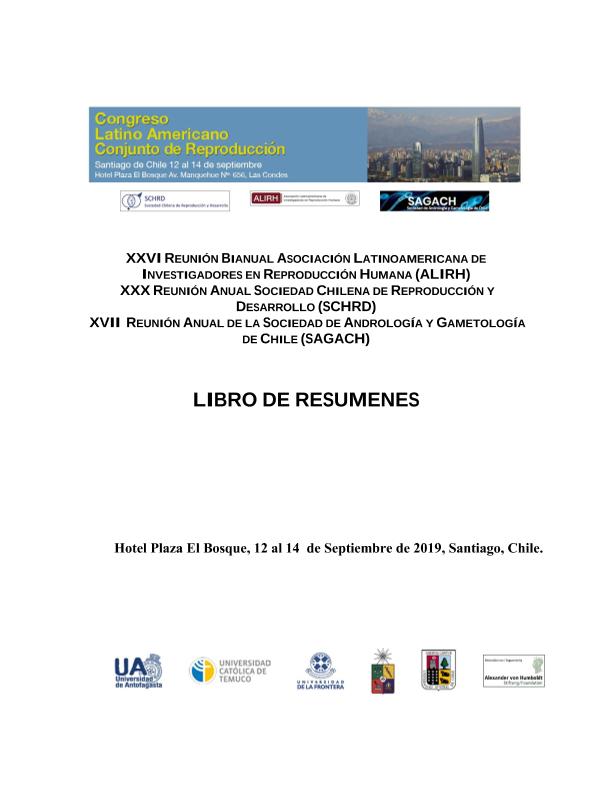Mostrar el registro sencillo del ítem
dc.contributor.author
Oresti, Gerardo Martin

dc.contributor.author
Santiago Valtierra, Florencia Ximena

dc.contributor.author
Reyes, Juan
dc.contributor.author
Aveldaño, Marta Isabel

dc.date.available
2024-01-12T10:03:27Z
dc.date.issued
2019
dc.identifier.citation
Enzymes involved in the biosynthesis of sphingolipids with very-long-chain PUFA concur with male germ cell differentiation; Congreso Latinoamericano Conjunto de Reproducción; Santiago; Chile; 2019; 2-3
dc.identifier.uri
http://hdl.handle.net/11336/223466
dc.description.abstract
The sphingolipids sphingomyelin (SM) and ceramide (Cer), of male rodent germ cells (spermatocytes, spermatids) and spermatozoa contain very-long-chain (C28-C32) polyenoic fatty acids (VLCPUFA) in nonhydroxy (n-V) and 2-hydroxy forms (h-V) not present in Sertoli cells. During postnatal development, SM and Cer species with n-V appear in testes concomitantly with pachytene spermatocytes and those with h-V with spermatids. Both are able to biosynthesize their own sphingolipids, the former more actively than the latter. The biosynthesis of n-V requires elongation of PUFA (20:4n-6, 22:5n-6) by elongation of very-long-chain fatty acid (Elovl) proteins, while that of h-V requires a fatty acid 2-hydroxylase (Fa2h). Elovl5 and Elovl2, coding for enzymes responsible for PUFA biosynthesis, and Elovl4, in turn responsible for the formation of PUFA longer than C26, are actively expressed in germ cells. The Elovl4 protein is exclusively expressed in germ cells in a stage-dependent manner, spermatocytes displaying the highest Elovl4 protein levels and enzymatic activity. Along with high proportion of h-V Cer and h-V SM species, the Fa2h protein is mainly concentrated in late spermatids, in the step of spermiogenesis in which they elongate and their heads change shape. Consistently, spermatocytes express the highest levels of ceramide synthase 3, required for the N-acylation of sphingosine with a VLCPUFA, while spermatids express the highest levels of SM synthase 2. Irrespective of the maturation stage, the small raftlike domains of the germ cell plasma membrane contain species of SM and Cer with saturated fatty acids, while those containing n-V and h-V abound in the large non-raft areas. These species, with unique physico-chemical properties, could play a structural role facilitating the germ cell shape changes associated with the progress of spermatogenesis. If released from such species, free n-V and h-V could be involved in germ cell differentiation as potential precursors of uncommon elovanoid-like bioactive derivatives.
dc.format
application/pdf
dc.language.iso
eng
dc.publisher
Universidad de Valparaíso
dc.rights
info:eu-repo/semantics/openAccess
dc.rights.uri
https://creativecommons.org/licenses/by-nc-sa/2.5/ar/
dc.subject
SPHINGOLIPID SYNTHASES
dc.subject
FATTY ACID ELONGASES
dc.subject
DE NOVO BIOSYNTHESIS
dc.subject
SPERMATOGENIC CELLS
dc.subject.classification
Bioquímica y Biología Molecular

dc.subject.classification
Ciencias Biológicas

dc.subject.classification
CIENCIAS NATURALES Y EXACTAS

dc.title
Enzymes involved in the biosynthesis of sphingolipids with very-long-chain PUFA concur with male germ cell differentiation
dc.type
info:eu-repo/semantics/publishedVersion
dc.type
info:eu-repo/semantics/conferenceObject
dc.type
info:ar-repo/semantics/documento de conferencia
dc.date.updated
2022-11-01T22:14:55Z
dc.journal.pagination
2-3
dc.journal.pais
Chile

dc.journal.ciudad
Santiago
dc.description.fil
Fil: Oresti, Gerardo Martin. Consejo Nacional de Investigaciones Científicas y Técnicas. Centro Científico Tecnológico Conicet - Bahía Blanca. Instituto de Investigaciones Bioquímicas de Bahía Blanca. Universidad Nacional del Sur. Instituto de Investigaciones Bioquímicas de Bahía Blanca; Argentina. Universidad Nacional del Sur. Departamento de Biología, Bioquímica y Farmacia; Argentina
dc.description.fil
Fil: Santiago Valtierra, Florencia Ximena. Consejo Nacional de Investigaciones Científicas y Técnicas. Centro Científico Tecnológico Conicet - Bahía Blanca. Instituto de Investigaciones Bioquímicas de Bahía Blanca. Universidad Nacional del Sur. Instituto de Investigaciones Bioquímicas de Bahía Blanca; Argentina. Universidad Nacional del Sur. Departamento de Biología, Bioquímica y Farmacia; Argentina
dc.description.fil
Fil: Reyes, Juan. Pontificia Universidad Católica de Valparaíso; Chile
dc.description.fil
Fil: Aveldaño, Marta Isabel. Consejo Nacional de Investigaciones Científicas y Técnicas. Centro Científico Tecnológico Conicet - Bahía Blanca. Instituto de Investigaciones Bioquímicas de Bahía Blanca. Universidad Nacional del Sur. Instituto de Investigaciones Bioquímicas de Bahía Blanca; Argentina. Universidad Nacional del Sur. Departamento de Biología, Bioquímica y Farmacia; Argentina
dc.relation.alternativeid
info:eu-repo/semantics/altIdentifier/url/https://schrd.cl/wp-content/uploads/2021/03/LIBRO-DE-RESUMENES-CONGRESO-CONJUNTO-REPRODUCCION-2019.pdf
dc.conicet.rol
Autor

dc.conicet.rol
Autor

dc.conicet.rol
Autor

dc.conicet.rol
Autor

dc.coverage
Internacional
dc.type.subtype
Congreso
dc.description.nombreEvento
Congreso Latinoamericano Conjunto de Reproducción
dc.date.evento
2019-09-12
dc.description.ciudadEvento
Santiago
dc.description.paisEvento
Chile

dc.type.publicacion
Journal
dc.description.institucionOrganizadora
Sociedad Chilena de Reproducción y Desarrollo
dc.source.revista
XXVI Reunión Bianual Asociación Latinoamericana de Investigadores en Reproducción Humana
dc.date.eventoHasta
2019-09-14
dc.type
Congreso
Archivos asociados
